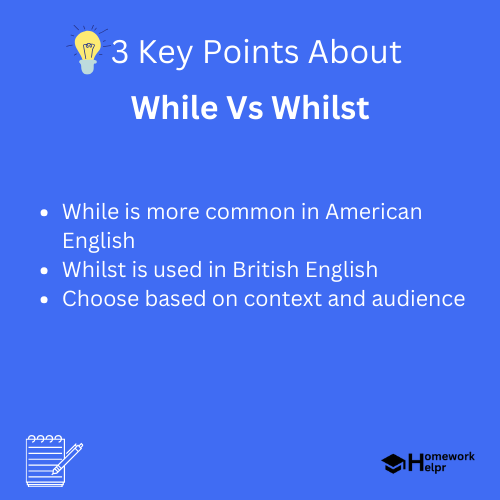📝 Summary
Understanding the difference between while and whilst is crucial for effective communication. While is commonly used in American English for simultaneous actions and duration, while whilst is more formal and found predominantly in British English. Both serve similar functions but should be selected based on context, audience, and intended tone. Using while in informal conversations and whilst in formal writings can enhance sophistication in your language. Recognizing these nuances can significantly improve clarity and communication effectiveness.
Understanding the Difference: While vs. Whilst
Language is an intricate web of rules and structures, and at times, even the most seasoned speakers can become entangled in its complexities. One such dilemma comes in the form of the words while and whilst. Although they are often used interchangeably, they carry distinct meanings and connotations that are essential to grasp for effective communication. Let’s delve into the meanings, uses, and contexts of these two terms to help you master their application.
The Meaning of While
The term while is a conjunction used frequently in the English language, especially in American English. It indicates the event of two actions occurring simultaneously or refers to a specific duration during which something happens.
- Simultaneous Actions: “I read a book while waiting for the bus.”
- Duration: “She studied while he cooked dinner.”
In addition to its conjunction uses, while also functions as a noun and indicates a specific period of time spent on an activity, as in “it has been a while since we last met.”
Definition
Conjunction: A word that connects clauses or sentences. Duration: The length of time during which something happens.
The Meaning of Whilst
Whilst is primarily used in British English and is often perceived as a more formal or old-fashioned version of while. Although its meaning is largely identical, whilst is commonly found in literary or formal contexts.
- Formal Writing: “I shall complete my homework, whilst you prepare dinner.”
- Literary Usage: “To thine own self be true, whilst thou art still young.”
Similar to while, it can denote simultaneous actions or serve as a connector between two statements. However, using whilst can add a certain scholarly or sophisticated vibe to writing.
Definition
British English: The variant of the English language spoken primarily in the United Kingdom. Literary Context: Situations or texts that emphasize artistic expression.
Usage in Different Contexts
The choice between while and whilst often hinges upon the context in which you are writing or speaking. Understanding your audience is crucial for making the correct choice. Here are some guidelines:
- Formal Documents: Use whilst to convey sophistication.
- Informal Conversations: Prefer while to keep things straightforward.
- Literary Works: Whilst can add depth and character.
While both words serve similar functions, understanding the nuances can lead to enhanced clarity and effectiveness in communication.
Examples
1. “He was enjoying his time outdoors while she was inside studying.” (Use of while in American English) 2. “She wrote whilst sipping her tea.” (Use of whilst in British English)
Common Misconceptions
One common misconception is that while is slang or a less formal option when compared to whilst. In reality, both terms are correct; the difference lies primarily in regional preferences and the style of writing. It’s important to use them according to the audience and the context.
For instance, in a legal or academic paper, whilst might lend an air of professionalism, while a casual conversation or email may benefit from the brevity and straightforwardness of while.
❓Did You Know?
Interestingly, the word whilst has been in use since the 14th century, showcasing the long-standing nature of our linguistic heritage!
How to Remember the Difference
To help remember the distinction between while and whilst, consider this simple guideline: think of whilst as a ‘posh’ or ‘fancy’ version of while. You can think of it as a word that dresses up your sentences!
Here are some tips to enhance your understanding:
- Practice Contextual Use: Create sentences which use both terms correctly.
- Read Widely: Literature often uses whilst, while newspapers may prefer while.
- Listen: Pay attention to British vs American English in media.
Conclusion
In conclusion, while while and whilst may appear similar at first glance, they offer different flavors to the English language. Understanding their specific uses, and the contexts in which they thrive, can significantly enhance your proficiency in communication.
As you continue to learn and grow, focus on the nuances that make English both fascinating and sometimes challenging. Whether you choose to use while or whilst, make sure you are confident in the choice you are making. Each word brings its own tone and texture to your speech and writing!

Related Questions on While Vs Whilst
What is the primary difference between while and whilst?
Answer: While is more common in American English, whilst is used in British English.
When should I use whilst?
Answer: Use whilst in formal writing or literature.
Can I use while and whilst interchangeably?
Answer: Yes, but it depends on context and tone.
Is whilst considered old-fashioned?
Answer: It is seen as more formal or literary but not necessarily old-fashioned.
